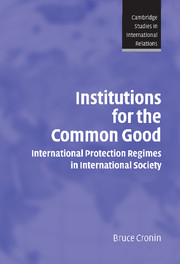Book contents
- Frontmatter
- Contents
- Acknowledgments
- 1 Introduction: international relations theory and the common good
- 2 International protection regimes in an international order
- 3 The national state and the protection of ethnic minorities
- 4 The liberal state and the protection of European citizens
- 5 The multicultural state and the protection of ethnic communities
- 6 The nation-state and the protection of refugees
- 7 Conclusion
- Bibliography
- Index
- CAMBRIDGE STUDIES IN INTERNATIONAL RELATIONS
2 - International protection regimes in an international order
Published online by Cambridge University Press: 22 September 2009
- Frontmatter
- Contents
- Acknowledgments
- 1 Introduction: international relations theory and the common good
- 2 International protection regimes in an international order
- 3 The national state and the protection of ethnic minorities
- 4 The liberal state and the protection of European citizens
- 5 The multicultural state and the protection of ethnic communities
- 6 The nation-state and the protection of refugees
- 7 Conclusion
- Bibliography
- Index
- CAMBRIDGE STUDIES IN INTERNATIONAL RELATIONS
Summary
Martin Wight argues that the fundamental political task of an international society is to provide order and security, from which law, justice, and prosperity can then follow. On one level, we can equate order with stability and define security in terms of freedom from threat. In this sense, both can be viewed as environmental conditions. Thus, we consider international life to be ordered if it is based on predictable, recurrent relations, and secure so long as the units remain independent and free from physical danger. On another level, however, order can be viewed as a pattern of activity that sustains particular social goals, and security can be defined as the protection of particular social institutions. From this perspective, order is a social structure that represents the institutionalization of a particular set of values. “International ordering” is the construction of political and social relations among independent actors.
While both conceptions reflect elements of international life, for the purposes of this study I consider order to be a social structure rather than an environmental condition. Therefore the key question is not how order can be maintained in international relations but rather what kind of order political actors seek to maintain. In this chapter I examine how political leaders define order and the means they employ to sustain it. In particular, I focus on the efforts of core states to develop a consensus around a set of fundamental principles of order and how the protection of foreign populations helps to promote these principles.
- Type
- Chapter
- Information
- Institutions for the Common GoodInternational Protection Regimes in International Society, pp. 33 - 55Publisher: Cambridge University PressPrint publication year: 2003



